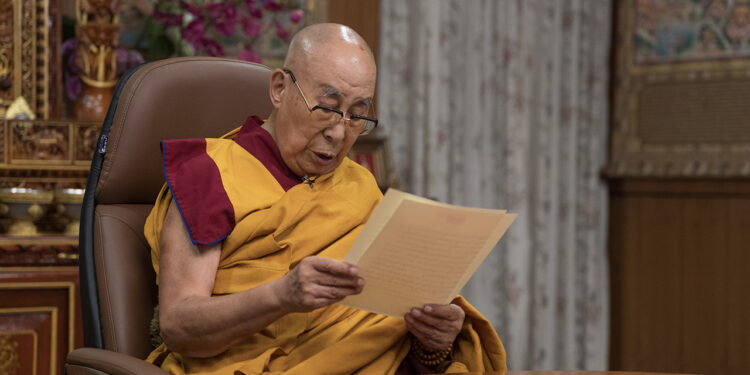Dharamshala, India – July 2, 2025 – In a significant announcement ahead of his 90th birthday on July 6, the 14th Dalai Lama, Tenzin Gyatso, has affirmed that the Gaden Phodrang Trust, a non-profit organization he established, will have exclusive authority to identify his successor, firmly rejecting China’s claims to control the reincarnation process of the next Tibetan spiritual leader. The statement, made during the 15th Tibetan Religious Conference in Dharamshala, India, has reignited tensions with Beijing and holds profound implications for Tibetan Buddhism and global geopolitics.
Speaking via a video message to an audience of over 100 Buddhist monks and international supporters, including Hollywood actor Richard Gere, the Dalai Lama emphasized that the selection of the 15th Dalai Lama will follow traditional Tibetan Buddhist practices. “I hereby reiterate that the Gaden Phodrang Trust has sole authority to recognize the future reincarnation; no one else has any such authority to interfere in this matter,” he declared, referencing a 2011 statement that outlined the Trust’s role in the succession process. He added that the search will involve consultation with heads of Tibetan Buddhist traditions and traditional divination methods, ensuring adherence to centuries-old customs.
The Dalai Lama’s announcement ends years of speculation about whether the 600-year-old institution of the Dalai Lama would continue after his death. The Nobel Peace Prize laureate, who fled Tibet in 1959 following a failed uprising against Chinese rule, also clarified that his successor could be of any gender and does not need to be of Tibetan nationality, broadening the scope of the reincarnation process. Samdhong Rinpoche, a senior official of the Gaden Phodrang Trust, confirmed that the Dalai Lama is in good health and has not yet provided written instructions on the succession.
A Direct Challenge to China
The Dalai Lama’s statement is a pointed rebuke to China, which has long asserted its authority over the reincarnation of Tibetan Buddhist leaders, including the Dalai Lama. Beijing, which annexed Tibet in the 1950s and views the Dalai Lama as a separatist, insists that the successor must be approved by its central government through a ritual dating back to the Qing dynasty. In 2007, China enacted a law requiring state approval for all reincarnations of senior Tibetan lamas, a move widely seen as an attempt to control Tibetan religious and cultural identity.
China’s Foreign Ministry spokesperson, Mao Ning, reiterated Beijing’s stance on Wednesday, stating that the Dalai Lama’s reincarnation “must be approved by the central government” and conducted within China’s borders. This position has drawn international criticism, particularly from the United States, which passed the Tibetan Policy and Support Act in 2020, affirming that the selection of Tibetan Buddhist leaders is a religious matter for the Tibetan community alone.
The Dalai Lama has repeatedly urged his followers to reject any successor appointed by Beijing, emphasizing that his reincarnation will likely be born outside China. This stance recalls the case of the 11th Panchen Lama, Gendun Choki Nyima, who was recognized by the Dalai Lama in 1995 but disappeared shortly after at the age of six. China subsequently appointed its own Panchen Lama, a figure rejected by many Tibetans. The unresolved disappearance of Gendun Choki Nyima remains one of the world’s longest-standing cases of enforced disappearance, according to Human Rights Watch.
Global Implications and Support
The Dalai Lama’s announcement has been hailed as a strategic move to preserve Tibetan spiritual autonomy and counter China’s influence. Tenzin Tsundue, a Tibetan writer and activist, described it as a “punch in the face” to Beijing, underscoring its significance in thwarting China’s attempts to control the succession. India, where the Dalai Lama has lived in exile since 1959, has supported his spiritual activities, with 46 Indian lawmakers signing a declaration in March 2025 backing his right to choose his successor.
The decision also carries weight for the global Tibetan diaspora and millions of Buddhist followers who revere the Dalai Lama as a living embodiment of compassion. The Gaden Phodrang Trust, established in 2011 and based in Dharamshala, is tasked with preserving Tibetan culture and supporting the Tibetan community. Operating under India’s protection, it strengthens Dharamshala’s position as the center of Tibetan spiritual legitimacy.
Looking Ahead
As celebrations for the Dalai Lama’s 90th birthday continue in McLeodganj, the seat of the Tibetan government-in-exile, the international community is closely watching the unfolding succession dispute. The Dalai Lama’s affirmation of the Gaden Phodrang Trust’s authority sets the stage for a potential clash with China, which may appoint a rival Dalai Lama to assert control over Tibet. This could result in two competing Dalai Lamas, a scenario that would deepen divisions and challenge the spiritual unity of Tibetan Buddhism.
For now, the Dalai Lama’s followers are celebrating his commitment to the continuation of his institution. “This is a direct message to the Chinese government,” said Krma Choying, Secretary of the Department of Information and International Relations of the Central Tibetan Administration. “The next reincarnation will be selected by our side, not by the other.”
The Dalai Lama’s announcement not only reaffirms his spiritual legacy but also underscores the ongoing struggle for Tibetan autonomy in the face of geopolitical tensions. As the world awaits further developments, the Gaden Phodrang Trust stands poised to carry forward a tradition that has endured for over six centuries.




































